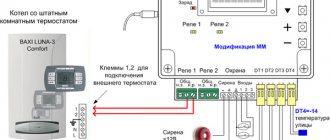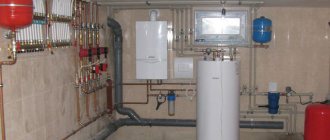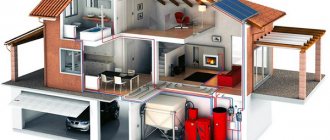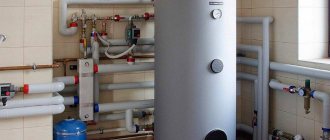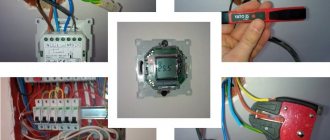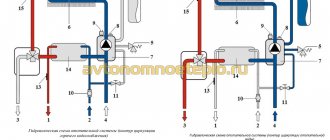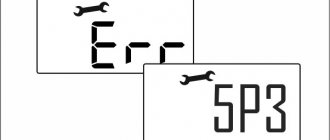A UPS for a gas boiler is not a cheap thing, so a reasonable question arises for the economical homeowner: why do you need an uninterruptible power supply? The fact is that modern gas equipment is increasingly designed to be energy-dependent and equipped with sophisticated electronics designed to make our lives easier. All kinds of control systems, ignition, program control and other functions require uninterrupted electrical power. In addition, of course, electronic components are sensitive to sudden voltage changes.
Emergency situations leading to power outages and power surges will most likely lead to failure of your heat generating device. Being left without heating in a private country house is an unpleasant prospect. Not only will household members experience severe discomfort, but even worse, all plumbing equipment - pipes, radiators, water supply systems - will become completely unusable as a result of negative temperatures.
Avoiding such a catastrophe is quite simple if a prudent owner thinks in advance which uninterruptible power supply (UPS) for a gas boiler will provide him with complete protection from unforeseen situations. Needless to say, the uninterruptible power supply for a gas boiler will retain warranty service?
It is necessary to take into account that when there are surges in the network, first of all, electronic elements fail, but the reason “unstable electrical network” is always interpreted by the service center as not a warranty case. So, we believe that the question of the need to install a UPS, UPS, or, more simply, an uninterruptible power supply, is closed.
Note that UPS for gas boilers are presented in a huge range and are divided into three main types. We will look at what knowledge we need to choose the best uninterruptible power supply in our review.
At the end of the review, we will bring to your attention the most popular models of uninterruptible power supplies in demand in the domestic market. Let's take a look at the Internet and read some customer reviews about the experience of using the UPS. And about how to correctly connect a UPS with your own hands.
Why do you need a UPS?
In our country in winter we cannot do without heating. Moreover, heating is desirable without failures or stops - in severe frosts the system may defrost. When organizing the system, you must remember that most modern boilers are controlled automatically, and the movement of coolant in the system is ensured by circulation pumps. All this equipment runs on electricity.
When creating a redundant power system, it is necessary to install an uninterruptible power supply for the gas boiler (also called a UPS, UPS or uninterruptible power supply)
Taking into account the fact that power outages are not uncommon in winter, it is necessary to take additional measures to create redundant power supplies. In most cases, a UPS is installed - an uninterruptible power supply. Its task is to supply power from the batteries in the event of a power failure or “sag” in the network.
Choosing a battery
Let's see how to choose a battery for a gas heating boiler (or rather, for our uninterruptible power supply). First, you need to look at the batteries of what capacity the purchased UPS supports (remember about the charge current). In accordance with this, we proceed to the selection of batteries. They are divided into two types:
We recommend choosing maintenance-free batteries for your gas boiler, as they can also be installed at home.
- Serviceable - they require periodic addition of water or electrolyte;
- Maintenance-free - uses gel electrolyte, so does not require any maintenance.
Maintenance-free batteries do not require any fuss with electrolyte and water, and do not emit dangerous gases (hydrogen) into the air. Therefore, they can be safely placed in unventilated areas. But serviceable batteries in a UPS can only be used when they are installed in technical, ventilated rooms (for example, basements, where the gas boiler itself can be installed).
Please note that the batteries being serviced are nothing more than car batteries - with a voltage of 12 or 24 V.
When installing an uninterruptible power supply for a gas heating boiler, you should take care of saving money. We do not recommend buying two batteries of 50 A/h each, since it is more profitable to choose and purchase one battery for a UPS with a capacity of 100 A/h. And if you want to save money and buy a 75 A/h battery instead of 100 A/h, then it is better to give preference to the latter battery, since the difference in capacity will be minimal.
Features of choice for gas boilers
An uninterruptible power supply for a gas boiler must be selected so that it supplies a voltage of the correct shape - as close as possible to an ideal sinusoid. In this case, phase synchronization of the sinusoid is also important.
All these requirements are necessary to ensure normal operation of the control unit. In most imported gas boilers, the automation is based on electronics, which is demanding in terms of the quality of the power supply. To assess how important this requirement is, it is worth saying that according to statistics from service centers, about 40-55% of gas boiler breakdowns are associated with failure of the control board. At the same time, boards are almost never repaired. They simply need to be replaced.
This is what the UPS connection block diagram looks like:
It is also worth remembering that failure of the control board due to unstable power supply is not a warranty case (for almost all manufacturers). So you have to pay the cost of the board and its replacement out of your own pocket. Moreover, many boards are supplied “to order”, and this means several weeks of waiting. How to heat the house at this time is an interesting question... If you also remember that the cost of the board is about 40-50% of the cost of the unit, you inevitably think about purchasing a high-quality and reliable uninterruptible power supply for a gas boiler.
The good news is that one UPS of sufficient power can power the rest of the equipment that requires high-quality and guaranteed power, or you simply want to ensure its uninterrupted operation. Most often these are computers, televisions and a couple of emergency lighting bulbs.
It is better to connect batteries in parallel than in series
There is an opinion that it is better to take a UPS with a 12V battery voltage and connect several batteries in parallel to increase the total capacity than to take a 24/48V UPS and connect the same batteries in series. As an argument, the need to balance batteries is usually given if they are connected in series, but what is overlooked is that each battery consists of 6 elements, balancing of which, in principle, is not provided for by the design of the battery, and yet it still works somehow. In my case, 4 12V batteries are connected to two UPSs; after two years of use, the difference in battery voltage was less than a tenth of a volt.
Types of uninterruptible power supply
Today, the retail chain offers three types of UPS:
- off-line (on-line);
- on-line (off-line);
- Line-Interactive (line-interactive or linear-interactive).
Types of UPS for gas boilers and block diagrams for their connection
Offline UPS (standby type)
These are the simplest and cheapest uninterruptible power supplies. Off-line can be translated from English as “not in line,” which reflects the operating principle of this device. In this type of uninterruptible power supply, the upper and lower voltage limits are set at which the boiler operates normally. As long as the network parameters are within these limits, power is supplied directly from the line.
If the voltage becomes higher or lower, the switching relay is activated and power is supplied through the UPS from the batteries. When the network parameters return to normal, the relay is activated again, turning off the uninterruptible power supply. For a gas boiler, such protection is, of course, better than nothing, but when turning it on/off, significant voltage surges are observed in the network. So the stabilization in this case is not complete - there are no large dips or peaks, but the supply voltage is far from ideal. The second disadvantage of offline-type uninterruptible power supplies is that they cannot correct the shape of a sinusoid.
Scheme of operation of offline UPS (UPS)
Therefore, off-line uninterruptible power supplies for gas boilers should only be used if you already have a stabilizer installed in your home or apartment. It produces ideal voltage, and the UPS in this circuit simply connects the batteries in the absence of voltage. This scheme is expensive, but creates normal conditions for the operation of equipment that is demanding on the quality of the power supply.
On-line UPS (permanent type)
This type is also called double conversion uninterruptible power supplies. All because of the operating principle:
- The AC voltage supplied to the input is converted to DC and is used to charge the batteries connected to the device.
- Direct voltage is converted into alternating voltage with a sinusoid of ideal shape.
It turns out that the power supply is converted twice. This guarantees voltage stabilization and an ideal sinusoid shape.
Scheme of online uninterruptible power supply
Online uninterruptible power supplies are connected to a power supply circuit break. While the voltage is normal, linear power is converted; when the voltage is low, its deficiency is compensated by charging the batteries; in the absence, power is supplied from the battery.
The disadvantage of this equipment is the high price and rapid discharge of batteries, which is due to the fact that it is spent on straightening surges. However, if you need the best uninterruptible power supply for a gas boiler, buy equipment online.
Line-Interactive (line-interactive)
The properties and characteristics of uninterruptible power supplies of this type are not as good as those of online models, but not as bad as those of offline units. There are the same batteries and a switch that connects the UPS when the voltage drops. But to stabilize the voltage, there is a special unit - an automatic voltage regulator (AVR in the figure above).
How does an interactive uninterruptible power supply work?
The disadvantage of linear-interactive uninterruptible power supplies for a gas boiler is non-instantaneous switching when the voltage changes. But it is much less than in offline devices, but the voltage is maintained constant (within certain limits). This equipment is the best choice, as it guarantees good results at a relatively low price.
Stabilizer: to be or not to be?
Most Russian power grids are very far from ideal. Outdated equipment and frequent violations that occurred during installation are to blame for their low quality. As for voltage, it is often lower than standard indicators - 220 V - by 10-15%.
We need a defender: the pros
Power surges that occur due to the arrival of a thunderstorm front, hurricane winds, or the owners or neighbors turning on powerful equipment—a washing machine, a new “cool” refrigerator, a vacuum cleaner, tools, or electric heaters—are already considered a normal phenomenon.
A voltage stabilizer (electrical or electromechanical) maintains this value within a certain range. At 200 V, modern models can function, but when reduced to 180 V, the risk of malfunctions or complete shutdown of the equipment increases. A voltage surge up to 250 V leads to burnout of electrical circuits. Replacing them is expensive: for repairs you will need to pay 30-50% of the price of a gas boiler.
The risk of being left with non-working equipment is eliminated by connecting a gas boiler through a stabilizer. An unstable mains voltage is supplied to its input, and at the output it is converted into an ideal 220 V with a pure sine wave. The system will function without overload, which means that breakdowns due to voltage are excluded. If it is impossible to stabilize the parameters, the device simply breaks the circuit, protecting the unit from overload.
The device is not needed: arguments against
Some owners are skeptical about such protection. They claim that buying a stabilizer is a waste of money. A typical argument is the absence of serious network surges. However, no one can be immune from them. There are other arguments in favor.
- Any natural disaster, even strong winds, can negatively affect power lines.
- The human factor also plays a significant role. No one can be insured against the “visiting” of an unscrupulous electrician, or against accidental damage to electrical wiring.
Another potential threat is the ever-expanding range of household appliances. Its abundance leads to the “fouling” of houses with all sorts of powerful energy consumers, and this is an almost one hundred percent guarantee of a power surge.
When does a stabilizer not help?
Connecting a gas boiler through a stabilizer is necessary if power surges are short-term and power outages are rare. Most devices will not help in the following cases:
- when a power line is struck by lightning, a surge protector will save you from it;
- if there is a sudden and long-term power outage, a UPS is needed for such situations;
- when you need to correct the frequency of the input voltage: only inverter models can do this.
A possible alternative to an inverter stabilizer is an online UPS (double conversion technology).
Potential, cheaper replacement
Less expensive devices can handle the task assigned to the stabilizer:
- A regular surge protector can protect a gas boiler. Or the one that is included in the UPS, although it can no longer be called a cheap purchase.
- It is easy to prevent power failure due to high or low voltage using a power control relay.
The best option is an inexpensive UPS online. If you also add a surge protector and a voltage relay, then such comprehensive protection can already be called almost impenetrable. To be or not to be a separate device, everyone decides for himself. Connecting a gas boiler through a stabilizer is one of the options, but the owners of the equipment must choose the method of protection.
Determining UPS parameters
Determining what type of uninterruptible power supply you need for a gas boiler is not all. You need to know at least two more parameters: the power of the UPS and the capacity of the batteries that it can charge.
An example of technical characteristics of an uninterruptible power supply for a gas boiler
How to determine the power of an uninterruptible power supply
To decide how much power you need from an uninterruptible power supply, look for the line “power consumption” in the gas boiler’s passport. On average it is 150-170 W. If there is a second circulation pump in the system, its power consumption must be added to this figure.
Uninterruptible power supplies must be selected according to the power of the connected equipment
For everything to work without problems, you need a power reserve of at least 20-30%. If possible, when choosing a UPS, the result obtained can be doubled - just in case. Sooner or later, you will want to add a couple of devices to the load, since it is really convenient when, in the absence of electricity, at least something works for you. This will be the minimum power of the uninterruptible power supply for the gas boiler.
Determining the battery capacity
Many UPS models have built-in batteries. In this case, you don't need to count anything. If the batteries are connected separately, you need to find the line “maximum charge current” in the technical specifications. We multiply this figure by 10 and get the battery capacity that this UPS can charge. You can connect larger batteries, but in this case they will not be fully charged, which shortens their service life.
Dependence of battery capacity and boiler operating time
How to choose a UPS with built-in batteries? According to the battery life you need. The dependence of operating time on battery capacity and power consumption is shown in the table. Using it, selecting an uninterruptible power supply for a gas boiler is generally not difficult.
Power backup time
Perhaps the priority factor that determines the choice. UPSs for computers are capable of providing power for a very short period of time - no longer than 10 minutes. This is explained by the use of a small number of batteries, placed either in the equipment housing or separately.
Specialized ready-made solutions for boilers take into account the requirements for battery life, which ranges from 8-12 hours to a day or more. At the same time, other parameters are provided that guarantee the operation of the equipment of the autonomous heating and hot water supply system of a private house, cottage, or even apartment:
- “Pure sine” at the output - the absence of “modified” pulse voltages that are unacceptable for sensitive automation and pumping equipment.
- Long backup time for uninterrupted operation of boiler equipment is at least 6-8 hours (depending on the equipment and the volume of batteries of the inverter system - over 12 hours). It is possible to install the battery for a reserve of 2-3 hours, if necessary.
- Preservation of operability under repeated overloads. Computer UPSs are able to withstand such tests, but the life of their batteries in this case is significantly reduced.
Long-term reserve is perhaps an equally important parameter. With frequent and relatively long-term discharging and charging, the batteries of computer power supplies quickly fail. As a result, their reservation time is significantly reduced. As for special UPSs for the home and boiler, a block of AGM batteries is installed separately in them. There are no difficulties with how to connect additional batteries if the current total capacity of the batteries is not enough to meet the needs of the gas boiler.
Criteria for choosing a UPS for a gas boiler
From all that has been said, we can deduce the following requirements for an uninterruptible power supply for a gas-fired boiler:
- Special UPSs with an output voltage in the form of a sine wave are required. Uninterruptible power supplies are not suitable for computers. At the output they produce not a sinusoid, but a meander - the voltage is also alternating, but not round, like a sinusoid, but with a cut off top. For computers, such voltage is not a hindrance, but for a heating system it’s even worse. Such voltage has a bad effect on circulation pumps - they hum and operate jerkily. As a result, the impeller quickly wears out and the pump has to be replaced.
- The power of the UPS is selected with a reserve. If possible, double the power consumption.
- It is advisable to choose the online type; a good option is the interactive type.
- The capacity of the batteries must be selected so that if the power supply is turned off, the heating can operate for several hours (at least). This requirement is not critical if there is a generator. In this case, the battery should last long enough for it to start. By the way, this is another reason why you should not install computer uninterruptible power supplies for the boiler - they are designed to operate the equipment for 10-15 minutes. During this time, you can correctly shut down all programs and turn off the equipment. For the boiler, these minutes are too short a time.
- It is desirable that it be possible to connect additional external batteries (there must be connectors). This will be useful if you decide to increase the operating time of the heating from a backup power source or when connecting other equipment.
Connection diagram of a gas boiler to an uninterruptible power supply (UPS)
The requirements are not the most stringent, but it is advisable to adhere to them. When connecting an uninterruptible power supply, observe the phasing (the UPS phase must be connected to the boiler phase, zero and minus to the corresponding conductors). Otherwise the boiler will not work. Checking the correct phasing is simple: unplug the boiler from the network. The boiler must continue to operate. If the flame goes out, check the correct connection and proper grounding. If everything is normal, but the boiler still does not work, then your UPS is built without a “through zero”. To start the boiler, you need to connect the neutral N (zero) terminals at the input and output to the uninterruptible power supply. For most boilers, such a modification solves the problem. But there are some brands of boilers, for example, Buderus, which need to install a resistance of 1 to 10 MOhm between the PE and N inputs (ground and zero) (Buderus even offers to buy their branded resistor).
Actually, this is all about choosing and even connecting an uninterruptible power supply for a gas boiler.
Review of popular models
| Model | Type | Power, W | Capacity, Ah | Input voltage range, V | Number of sockets for consumers | Interfaces for connecting to a PC | Cost, from (rub.) | Customer Reviews |
| BASTION TEPLOCOM-300 | Off-line | 270 | 26–65 (2 pcs., external) | 185–245 | 1 | No | 8600 | Advantages: 5-year warranty, compact size, suitable for phase-dependent boilers, quick switching to reserve. Disadvantages: lack of a voltmeter, universal but inconvenient mounting, no stabilization (when operating from the network). |
| BASTION TEPLOCOM-600 | Line-interactive | 450 | 40–120 (2 pcs., external) | 188–245 | 1 | No | 11500 | Advantages: 5-year warranty, good battery life, suitable for phase-dependent boilers, good voltage stabilization, support for working with a generator. Disadvantages: lack of voltage and operating time indication, not the fastest transition between modes. |
| INELT Monolith K1000LT | On-line | 700 | 45–150 (3 pcs., external) | 120–295 | 2 | RS-232 | 18000 | Advantages: long battery life, instant switching to reserve, precise stabilization, detailed indication on the LCD display. Disadvantages: not suitable for phase-dependent boilers, noisy, rather large. |
| RUSELT Istok IDP-1-1/1-1-220-A | On-line | 800 | 18 (2 pcs., 12 V 9 A*h, built-in) | 120–300 | 3 | USB, RS-232, SNMP (board sold separately). | 20000 | Advantages: power, precise stabilization, instant switching, comes complete with built-in batteries. Disadvantages: short battery life. |
| Helior Sigma 2 KSL | On-line | 1600 | 42–200 (6 pcs., external) | 138–300 | 3 | RS-232, USB | 33000 | Advantages: very powerful at an affordable price, generator support, high battery charging current, good stabilization. Disadvantages: noisy, some users had problems with reliability. |
| Stark Country 3000 online | On-line | 2400 | 65–230 (6 pcs., external) | 110-300 | 4 | RS-232, USB, SNMP | 28500 | Advantages: high power, works with phase-dependent boilers and generators, long battery life, high-quality circuit design and assembly. Disadvantages: noise during operation, short warranty period. |
SVEN RT-500
Which UPS should I choose for my home without spending too much? The Russian brand “Sven”, which belongs to budget models, will save you here. Small, small and powerful (300 watts). It operates from a standard single-phase network, so there are no problems with connection.
Like all equipment from this manufacturer, it is very easy to operate. You don't need any special knowledge to set it up and put it into operation. All values are displayed on a liquid crystal display and controlled by only 2 buttons.
The stability of the output signal is also high. Disadvantage: high noise level. It reaches 56 decibels, so can sometimes cause serious interference, especially during sleep. On the other hand, the question “which is the best wall-mounted power supply for a small apartment” is answered by this model.
Starting currents
The third important point is the starting currents or power that is required to start the equipment. To do this, it is necessary that one important rule be observed: the starting power must be several times higher than the rated power.
But even here it is very important that its value does not exceed the maximum permissible. Otherwise, all parts will wear out much faster, which will cause the UPS to fail ahead of schedule.


